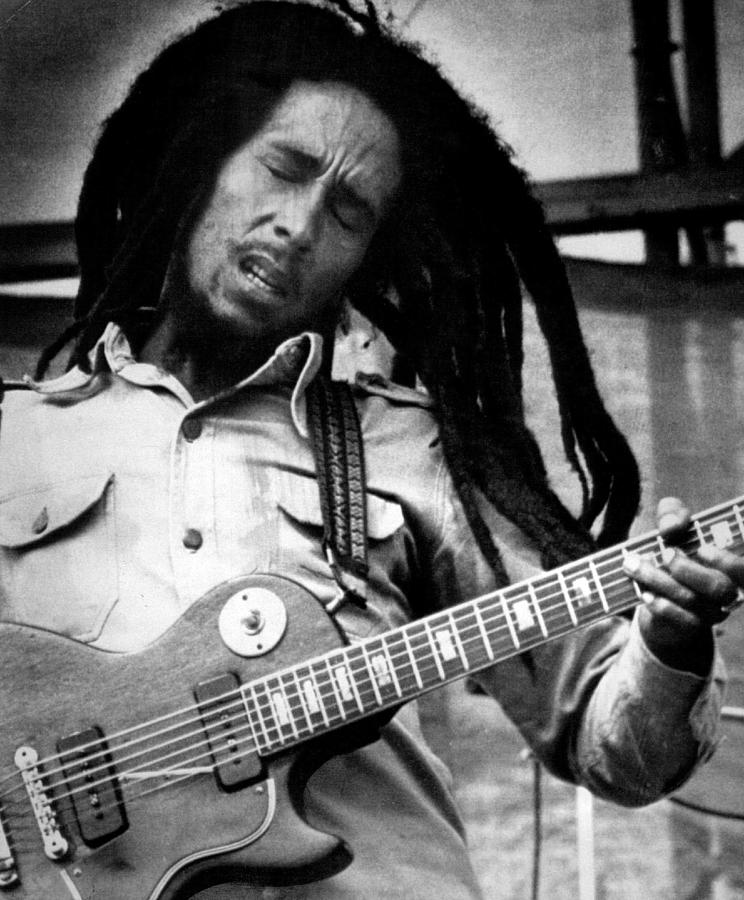The Musical Journey Of A Legend

Bob Marley, a name synonymous with reggae music, has not only left an indelible mark on the genre but has also inspired countless musicians and fans around the world. His ability to convey powerful messages through his music, often accompanied by his beloved guitar, has made him a symbol of peace, love, and social justice. The image of Bob Marley playing guitar evokes a sense of nostalgia and admiration, reminding us of the profound impact he has had on the music industry and society as a whole.
Born in Jamaica, Marley’s journey as a musician began at a young age, and he quickly became known for his unique sound that blended traditional reggae with rock and soul influences. His guitar playing was not just a means of creating music; it was an extension of his soul, reflecting his thoughts, feelings, and beliefs. As Marley strummed his guitar, he captivated audiences with his heartfelt lyrics and rhythmic melodies, making him one of the most influential figures in music history.
As we dive deeper into the life and legacy of Bob Marley, we’ll explore his biography, his musical style, and the significance of his guitar playing. What made his guitar skills stand out? How did they contribute to his iconic status? Join us as we unravel the story behind Bob Marley playing guitar and the profound impact it has had on music and culture.
Who Was Bob Marley? A Brief Biography
Bob Marley, born Robert Nesta Marley on February 6, 1945, in Nine Mile, Jamaica, rose to fame as a musician and cultural icon. He was the son of a British naval officer and a Jamaican mother, which influenced his perspective on life. Marley began his musical journey in the early 1960s, forming the group The Wailers, which eventually gained international fame. With hits like "No Woman, No Cry," "One Love," and "Redemption Song," Marley’s music transcended borders and resonated with people from all walks of life.
| Personal Details | Bio Data |
|---|---|
| Name | Bob Marley |
| Date of Birth | February 6, 1945 |
| Place of Birth | Nine Mile, Jamaica |
| Genres | Reggae, Ska, Rocksteady |
| Instruments | Guitar, Vocals |
| Date of Death | May 11, 1981 |
What Style of Guitar Did Bob Marley Play?
Bob Marley’s guitar style was heavily influenced by his Jamaican roots and the reggae genre. He primarily played acoustic and electric guitars, often favoring the rhythm and strumming patterns typical of reggae music. Marley's guitar playing was characterized by:
- Syncopated Rhythms: His use of off-beat strumming created the distinctive reggae sound.
- Chords and Melodies: Marley often combined simple chord progressions with catchy melodies, making his songs accessible to a wide audience.
- Fingerpicking: In some of his more acoustic tracks, Marley employed fingerpicking techniques that showcased his musical versatility.
How Did Bob Marley’s Guitar Playing Influence Reggae Music?
Bob Marley’s guitar playing played a crucial role in popularizing reggae music around the world. His innovative approach to rhythm and melody not only set new standards for reggae but also inspired generations of musicians. Key influences include:
- Fusion of Genres: Marley blended elements of rock, soul, and ska, paving the way for future artists to explore diverse sounds.
- Empowerment Through Music: His guitar-driven anthems often carried messages of resistance and hope, empowering listeners to embrace social change.
- Global Reach: Marley’s music transcended cultural and geographical barriers, bringing reggae to international audiences.
What Are Some Iconic Songs Featuring Bob Marley Playing Guitar?
Throughout his career, Bob Marley recorded numerous songs that showcased his exceptional guitar skills. Here are some iconic tracks:
How Did Bob Marley Use His Guitar to Convey Messages?
Bob Marley’s guitar was more than just an instrument; it was a tool for storytelling and social commentary. Through his music, he addressed various issues, such as:
- Social Justice: Many of his songs highlighted the struggles of marginalized communities and called for equality.
- Peace and Love: Marley's music often conveyed messages of unity, encouraging listeners to embrace love over hate.
- Spiritual Awakening: His Rastafarian beliefs influenced his lyrics, promoting themes of spirituality and connection to a higher power.
What Legacy Did Bob Marley Leave Behind?
Bob Marley passed away on May 11, 1981, but his legacy continues to thrive. His music remains a source of inspiration for artists across genres, and his guitar playing has set a benchmark for aspiring musicians. The impact of Bob Marley playing guitar can be seen in various ways:
- Influence on Artists: Many contemporary musicians cite Marley as a major influence in their work.
- Reggae Festivals: Events celebrating reggae music often pay tribute to Marley, showcasing his enduring popularity.
- Cultural Icon: Marley’s image and music continue to resonate with fans, making him a symbol of hope and resilience.
Why Is Bob Marley Playing Guitar Still Relevant Today?
Even decades after his passing, Bob Marley’s music and guitar playing remain relevant. In a world filled with challenges, his messages of love, unity, and social justice resonate with new generations. The influence of Bob Marley playing guitar can be felt in:
- Social Movements: His music has been embraced by various movements advocating for change.
- Music Education: Many guitarists study Marley’s techniques, ensuring that his style continues to be taught and celebrated.
- Global Music Collaborations: Artists from diverse backgrounds continue to collaborate and create music inspired by Marley’s legacy.
In conclusion, the image of Bob Marley playing guitar is not just a snapshot of a musician at work; it represents a powerful legacy that has shaped the music industry and inspired countless individuals. His guitar skills, innovative style, and profound messages continue to resonate, proving that the spirit of Bob Marley will always live on through his music.
ncG1vNJzZmirn521b6%2FOpmasp5idu6bD0qCcq7FjZK%2BwroymmKukla56sbjAsqCnn12cwqrAwKtloaydoQ%3D%3D